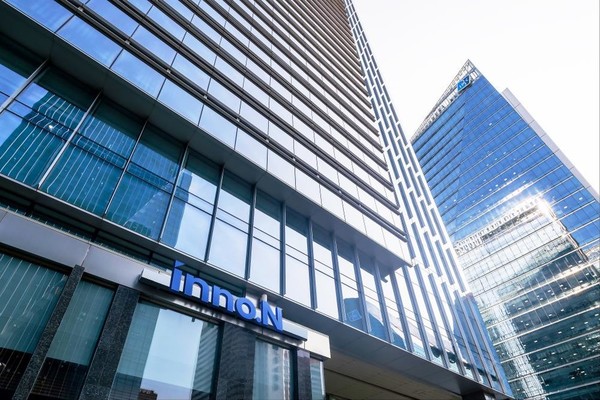Korea Biomedical Review is publishing a series of articles to analyze the top 10 Korean pharmaceutical and biopharma companies with the largest market capitalizations listed on the main bourse, Kospi, and the tech-heavy Kosdaq. The series aims to reflect key industrial issues and the flow of the capital market in the Korean pharmaceutical and biopharma industry. This marks the final installment. -- Ed.

HK inno. N's K-CAB (ingredient: tegoprazan), a treatment for gastroesophageal reflux disease (GERD), is expanding beyond the domestic market.
K-CAB is Korea's No. 30 new drug, launched in 2019, and leads the domestic market for peptic ulcer treatments.
The drug has revolutionized GERD treatment, transitioning from the conventional proton pump inhibitor (PPI) to the P-CAB category.
Notably, it is the fastest domestic drug to surpass 100 billion won ($75.2 million) in annual prescription sales.
Adding on to the domestic success, HK inno.N is expanding the market for K-CAB globally.
In 2022, K-CAB's domestic prescription sales amounted to 132.1 billion won, a 19.3 percent increase from 2021. The company is also accelerating its global expansion.
HK inno.N is targeting the global peptic ulcer drug market by actively targeting Southeast Asia and Latin America, which are emerging drug markets.
K-CAB has received approval in 35 countries overseas in the form of technology export or finished product export. Of these, the company has completed local launches in six countries, including China, Mongolia, the Philippines, Mexico, Indonesia, and Singapore.
Promoting efficacy at overseas conferences
The company was able to expand to overseas market at a fast pace thanks to organizing various academic events and symposiums for local doctors.
For example, to commemorate the launch in Singapore, UITC, HK inno. N's Singaporean partner organized a launch symposium for Singaporean gastroenterologists. Local and international gastroenterologists spoke to Singaporean doctors about the features of K-CAB and their experiences in prescribing it, sharing their latest insights.
In July, HK inno.N also held an academic event with Carnot, its partner in the Latin American market, for doctors in Mexico, Peru, and Colombia.
Steadily expanding prescription areas
According to the company, while conventional treatments, such as proton pump inhibitors (PPI), need three to five days to show efficacy, K-CAB drugs suppress gastric acid secretion in just one hour. In addition, K-CAB treatments also inhibit excessive secretion of gastric acid during nighttime, reducing chest pain and sleep disorders.
Additionally, it boasts the highest number of indications among products in its class, offering a diverse range of formulations and dosages, including tablets and orally disintegrating tablets.
Stock market also sees a bright future for HK inno.N.
Bookook Securities analyst Yoo Dae-woong said Monday that K-CAB's profitability will improve following a commission rate adjustment later this year.
"HK inno. N's K-CAB has realized sales that exceeded expectations at the time when the company signed a co-promotion contract with Chong Kun Dang," Yoo said. "As a result, high commission payments were inevitable."
However, with the co-promotion contract scheduled to end in 2023, the company is currently in discussions to negotiate rates that favor the company, Yoo added.
Yoo stressed that after the commission rate adjustment, K-CAB's profitability is expected to improve from 2024.
"In addition, profitability is expected to improve thanks to the launch of the orally disintegrating tablets and low-dose formulations, which are sold exclusively by HK inno.N," Yoo said. "The U.S. Phase 3 clinical trial is also progressing well, with plans to file a new drug application (NDA) in 2024 and launch in 2025."
Yoo stressed that his brokerage has issued a new "Buy" opinion with a price target of 51,000 won.
As of market close Wednesday, HK inno. N's shares stood at 38,400 won, down 0.39 percent from the previous trading day.
The company focused on developing next blockbuster through AI-based drug research
In addition, the company has been developing new drugs based on AI since 2019 to secure long-term growth momentum.
The company is currently focusing on the anticancer field, which it believes has a high global market value and a large unmet demand.
Notably, the company recently announced that it has discovered active substances pan-KRAS inhibitors that target KRAS gene mutations through its partnership with Txinno Bioscience and aims to secure a candidate by next year through active substance optimization and substance evaluation.
K-CAB generic competition heats up
The popularity and success of K-CAB have increased challenges from domestic companies to launch a generic version of K-CAB, which began in earnest late last year.
The number of bioequivalence tests approved by the Ministry of Food and Drug Safety (MFDS) is growing as more than 80 companies are currently challenging the patent for KCAB.
Most recently, the MFDS approved Jinyang Pharmaceuticals bioequivalence trial for Teracap Tab. 50mg on Sep. 5.
Jinyang is not the only company to launch a bioequivalence test against K-CAB, as Sam Chun Dang Pharm and Kukje Pharm have either completed or been conducting the test since May.
Notably, Sam Chun Dang was the first company to file a patent appeal with HK inno.N and was the first to develop a formulation.
The clinical trial has already concluded following approval, and the outcome of the patent review is expected to significantly affect K-CAB's market presence if the court rules in favor of Sam Chun Dang.
Related articles
- [Top K-Pharma Analysis ⑲] Seegene’ stock plunges to 1/9 of pandemic high
- [Top K-Pharma Analysis ⑱] Bioneer makes up for Covid-19 diagnostic kit sale loss with probiotics sales
- [Top K-Pharma Analysis ⑰] Analysts show high expectations for PharmaResearch, citing the global expansion of Rejuran
- [Top K-Pharma Analysis ⑯] Hugel accelerates global expansion following record-breaking sales
- [Top K-Pharma Analysis ⑮] ST Pharm turns from white elephant to cash cow for Dong-A Socio Holdings
- HK inno.N’s K-CAB chosen as outstanding technology leading Korean industry
- HK inno.N’s CAR-T cell therapy chosen as state-subsidized new drug project
- ‘If drugs can’t control your GERD, consider anti-reflux surgery’

